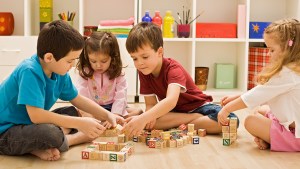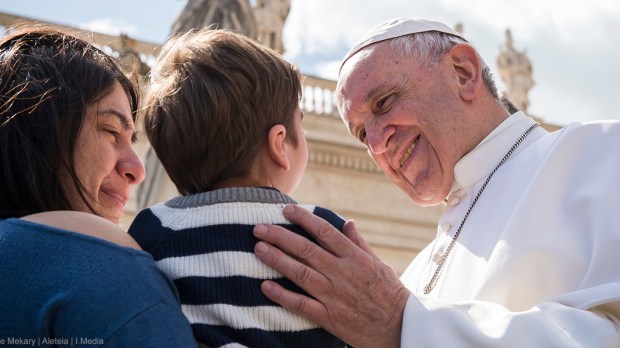Pope Francis addressed representatives of Europe’s first home for the orphaned and abandoned, members of the Institute Hospitals of the Innocents based in the Italian city of Florence, which is marking its 600th anniversary.
The Hospital of the Innocents was built by Filippo Brunelleschi in the 15th century, the first institution of its kind in Europe designed to care for and raise orphaned or abandoned children.
The Holy Father left aside his prepared remarks to speak of two main points: learning from children how to enjoy life, and spreading a global attitude of adoption.
Regarding adoption, he took up the image from an early tradition of the institute, in which a mother who dropped off a baby at the residence would take half of a medal, and leave her child the other half. The medal was a sign that the woman hoped to be able to recognize her children in better times, by reuniting the pieces of the broken medal.
“Those broken medals,” Francis mused … “Today in the world there are many children who in a sense have half a medal. They are alone. Victims of war, victims of migration, unaccompanied children, victims of hunger. Children with half a medal.”
And who has the other half? Mother Church. We have the other half. We need to reflect and make people understand that we are responsible for this other half and help make today another “home of the innocent,” more global, with the attitude of adoption. So often there are people who want to adopt children, but there is such a lot of bureaucracy – when there is no corruption in the middle, you pay and …
Francis simply asked for help. “Help me in this, to spread awareness that we have the other half of that child’s medal. Many, many families who do not have children and would certainly have the desire to have one through adoption.”
He called for the creation of a “culture of adoption because there are so many abandoned children, alone, victims of war and so on.” In seeing these children, the Holy Father urged, people need to learn to realize that they can help. People must, the pope said, “learn to look at that half [medal] and say, ‘I have another half too.'”
“I ask you to work on this. And thank you!”
Regarding a child’s love for surprise and delight in life’s simple things, the Holy Father brought up a favorite phrase of his: That God is a God of surprises.
We need a “culture of the child,” he said, referencing a term the institute president had used.
… seeing how they are surprised by life, how they come into contact with life. And we must learn to do the same. This way, this path we all have taken as children, we must take it again. … We must somehow go back to the simplicity of a child and above all the ability to be surprised. Surprises! Our God is the God of surprises, and we must learn this.
The Holy Father’s prepared remarks reflected on the beautiful history of the Florentine institute, which as he noted in his 2015 visit there, meant that “one of the first examples of Renaissance architecture was created to serve abandoned children and destitute mothers.”
At the beginning we see the generosity of a rich banker, Francesco Datini, who donated the amount with which it was possible to initiate this work. … The other striking element of this story is that the design was entrusted to Filippo Brunelleschi, the most important architect of the age, who at that time was working on a masterpiece that still today astonishes the world: the dome of the Cathedral of Santa Maria del Fiore. Because the same beauty dedicated to the house of the Lord should also be dedicated to the home of less fortunate children. Because for the children who needed to be welcomed, it was not enough to give the milk of the nurses, there was also the desire to raise them in an environment that was as beautiful as possible.

Read more:
Meet the 7 bells of Giotto’s Florence Campanile
Francis also reiterated again the tragedy of abortion.
Children who do not see the light because their mothers suffer economic, social, and cultural conditioning that drives them to give up that wonderful gift that is the birth of a child. How much we need a culture that recognizes the value of life, especially the weak, threatened, offended, and instead of thinking of being able to put it aside, to exclude it with walls and closures, be concerned with offering care and beauty! … Today the goal we must set ourselves, at various levels of responsibility, is that no mother be in a position to leave her child. But we must also ensure that in the face of any event, even tragic, that may detach a child from his or her parents, there are structures and processes of reception in which childhood is always protected and cared for, in the only worthy way: giving children the best we can offer them.

Read more:
Why simple toys are best for children

